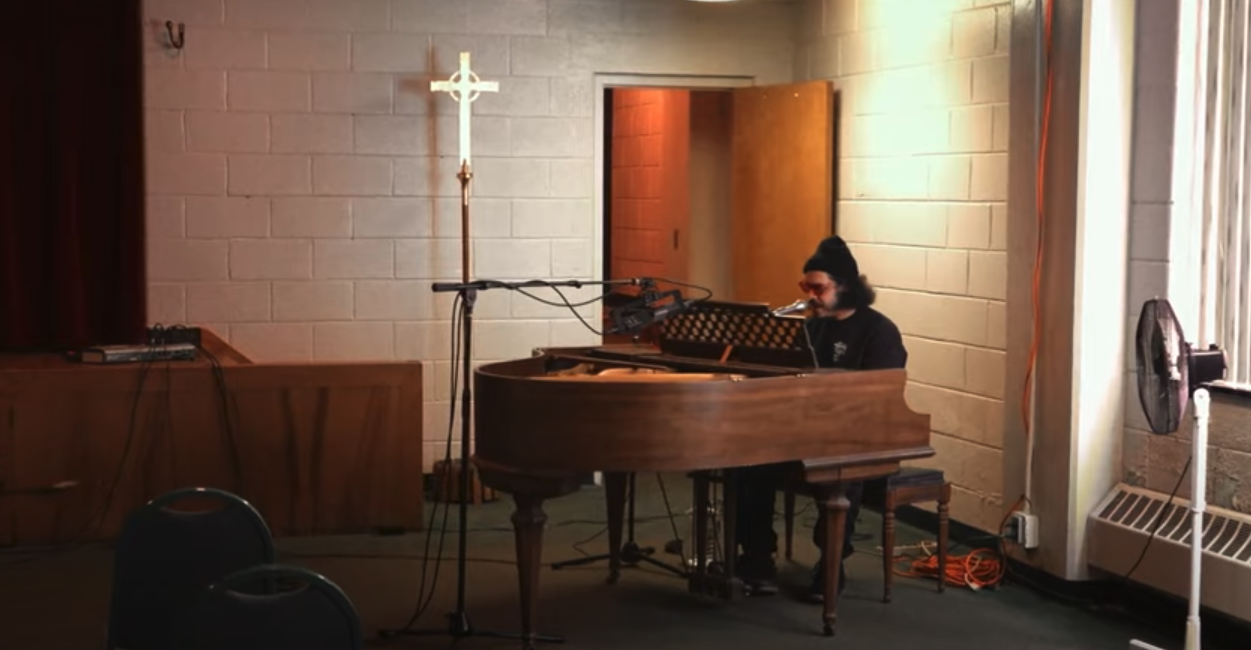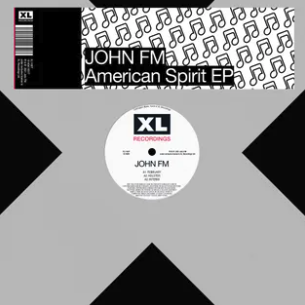JOHN FM’S SONIC ALCHEMY
In a recent interview with John FM, the Detroit-based producer, musician, and vocalist, we delved into his unique approach to music-making, his thoughts on the nature of failure, and his belief that Edgar Allen Poe was a Brooklynite. John FM's exceptional talent lies in his ability to channel the spirit of his hometown through his music, demonstrating a profound awareness of the significance of Detroit's techno scene and a steadfast commitment to preserving its fundamental principles of self-reliance and community. Through his compositions, John FM paints an unvarnished portrait of the gritty reality of the city, shedding light on its ups and downs with unflinching honesty. His latest release, American Spirit EP, offers listeners a glimpse of Detroit, using evocative sounds and samples as signposts. By masterfully blending his various influences and perspectives through his distinctive vocal style, John FM creates a musical narrative that offers a glimpse of hope in the midst of present-day challenges.
R–D: What makes you a ROUGH—DRAFT?
John FM: I'm constantly refining and constantly growing. That's what makes me a ROUGH–DRAFT. I mean, almost to a fault sometimes when I work on my creative endeavors I’m meticulous about it. So I'm trying to get out of the mode of being too meticulous and just doing. I think that what I'm trying to say is there are two different things that I'm doing. So either I'm doing it. Or I'm being too meticulous, like analysis paralysis, you know what I'm saying? Like I'm a watchmaker with a monocle. It might not seem like a big thing to you, but it’s what makes that Rolex perpetual. So fine-tuning is what makes that perpetual. That's what we're looking for. We're all trying to make perpetual shit that'll last forever.
R–D: I love that analogy, it's really interesting to hear about your approach. What does your notes app look like, and what's the first note in it?
John FM: My notes app could be clearer, to be honest. It has all sorts of things in it, from lyrics to itineraries, grocery lists, music I need to look up, lists for shows, and a couple of drafted tweets. The first note in it, chronologically speaking, is actually questions for Shà David, along with some content ideas for her. Like, where did the name Shà David come from?
R–D: How about if you could see anyone's notes, who would they be?
John FM: Hmm, that's a good question. The first name that came to mind was Edgar Allen Poe, although I don't know much about him other than that he was a Brooklynite (I think). I imagine his notes would be quite dark and gothic, and I'd be interested to see his thoughts.
R–D: How do you typically organize your ideas?
John FM: Honestly, I'm not great at organizing my ideas. But when I do write them down, I usually do it on a whiteboard or a huge mirror. That way, when I get into my studio, I can look at exactly what I need to work on. Once I've done that, I'll color-code the ideas to let me know how far along I am.
R–D: Who do you share your ideas with, and why?
John FM: I mainly share my ideas with my girlfriend, Jordan, and a few close friends. I value their opinions and perspectives, and they help me see things in a different light.
R–D: Where and how do you typically start your projects?
John FM: I usually start my projects in the car, listening to something while driving. I'll do my best to remember the lyrics and melody, and boredom often helps with generating ideas.
R–D: Have you ever released a project that initially felt unfinished? If so, what was it?
John FM: Yes, there have been a few projects that initially felt unfinished to me. One example is American Spirit, which was a Hail Mary. Even some of the early stuff I did with Omar S felt unfinished, but sometimes it's better to get the work out there than to pander and become self-indulgent in trying to find the perfect song. It was good practice for deciding when things felt completed.
R–D: How has criticism impacted your work, and when do you believe it holds significance?
John FM: Criticism holds significance in a very objective and functional state. First, you need to understand your goal. If you want to make mainstream art, you need to think broadly. This might involve simplifying the subject matter and making it more digestible while still being interesting. This approach can attract a larger audience. However, it may not satisfy your creative soul. On the other hand, achieving success is simple, but keeping it is a bitch. Once you get wrapped up in trying to maintain success, you may find yourself drifting away from what got you there in the first place. It took me messing up before I could listen to myself and create something that made me happy.
R–D: Have you ever worked on a project that you didn't know how to approach?
John FM: Yes, I have worked on projects that never saw the light of day, and I have collaborated with people that didn't work out. Sometimes, people want you to bring their vision to life, but they need a blueprint or an opinion. As a musician, you are supposed to be a master communicator. If you can't express what you are feeling, you can't expect your listeners to understand it.
R–D: When do you know that it's time to release your work into the world?
John FM: I feel most comfortable releasing my work when I believe that my vision has been fully realized. You just know when it's ready. In this industry, even when your vision is "seen," someone else may suggest otherwise. It's a give-and-take, but ultimately, you should listen to yourself as much as possible.
R–D: How would you describe your relationship with your work over the years?
John FM: Intimate. I don't like sharing things that aren't ready, and I prefer to work alone unless it's a collaboration. The best ideas come from isolation and boredom. My approach to collaboration has evolved over the years, and I try to use people as instruments as much as the instruments themselves. A band is just a cog in the machine, and if one cog isn't working, the whole thing will break down.
R-D: Can you recall a time when you experienced failure?
John FM: I had a teacher named Mr. Coleman in fifth grade who had five people in his band class, and we were the better musicians. In seventh grade, I saw him again, and he said, "Man, you could've been so good" because he saw something in me that I didn’t. Drums were never my path. Ultimately, I saw myself as the engine, not a cog. Working for myself in music is where I belong.
R–D: How did you envision being a musician, and how has your experience differed from your expectations?
JohnFM: In middle school, I thought being a musician was about traveling, partying, and getting girls. But things have changed significantly since then. Now, my main focus is creating something great that can outlast time.
R–D: What did life look like before music?
John FM: I was in fifth grade when I first realized that I wanted to pursue music. I had been in the school band, and I knew that music was my calling. I can't remember ever enjoying anything else. One of my earliest memories is watching my family dance to Gloria Estefan's "Primitive Love."
R-D: Prior to being recognized for your talent, was there ever a point when you doubted your ability to break through, before FXHE or XL?
John FM: No, I always believed it was going to happen, even if it didn't, I was determined to pursue it anyway. I never had a backup plan. I recently listened to the Questlove Supreme podcast, and they mentioned that "you don't make great things by putting them on the side." When you have a goal, it has to be your main priority.
R-D: What is currently the most discouraging aspect of being a musician?
John FM: Without a doubt, social media. Music has always been an industry that is image-based, but social media allows people to focus solely on appearances, rather than talent.
R-D: When do you feel most vulnerable?
John FM: Do you mean in a negative sense?
R-D: Do you perceive it as negative?
John FM: No, not necessarily. While some people may experience stage fright, I personally don't feel that way. However, I do feel vulnerable in situations where I am expected to behave in a particular manner or around my girl.
R-D: Is it accurate to say that you feel more "seen" or "heard" when performing live, as opposed to DJing?
John FM: Absolutely. When performing live, I am able to create my own story, even though I may be using the words of others. Sometimes, the echoes you hear aren't people chanting back at you, but rather the sound of an empty room. In my opinion, DJs are a dime a dozen, and it's much more challenging to play an instrument or sing and be that type of vulnerable on stage.
R-D: How do you recharge or find balance, and what is your vision of success in the music industry?
John FM: I prefer to step away from others to recharge my batteries. As an ambivert, I enjoy spending time with people, but I also need to be alone in order to feel reinspired. As for my vision of success, I believe it's important to always be pushing yourself and creating new music.
R-D: What advice would you give to someone who wants to pursue a career in music?
John FM: Are you absolutely certain you want to do this? [laughs] It's important to understand that being an artist isn't a stable profession. I am lucky to have found success in music, but it may not happen tomorrow, or even in a few years. Make sure this is what you genuinely want to do.
R-D: Do you follow your own advice?
John FM: Hell yeah, I do. One thing I need to work on is being healthier. I stopped smoking yesterday, for the 13th or 20th time.


